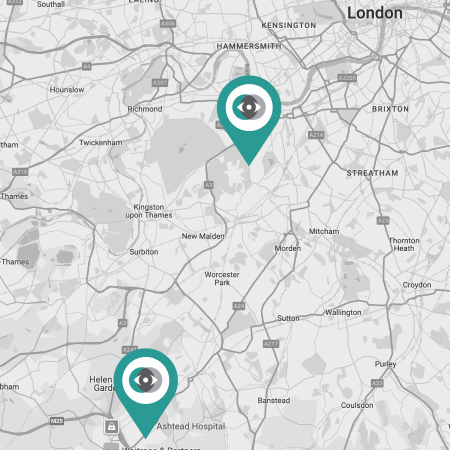
Can cataracts turn into glaucoma?
If you’ve been told you have cataracts, you might wonder whether they could turn into something more serious, like glaucoma. It’s a common question, and an important one.
The short answer is: no, cataracts don’t turn into glaucoma. They are two different eye conditions that affect vision in different ways. However, it is possible to have both at the same time, and sometimes cataracts can make glaucoma worse, or vice versa.
In this blog, we’ll explain the difference between cataracts and glaucoma, how they can affect each other, and what you can do to protect your sight. This information includes expert insight from Professor Paul Ursell, a leading cataract surgeon in Surrey, England.
Understanding cataracts
A cataract happens when the clear lens inside your eye becomes cloudy. The lens focuses light onto the back of your eye (the retina), helping you see clearly.
As we age, the proteins inside the lens can clump together, causing cloudiness. This makes your vision blurry or hazy, and colours may look dull or faded.
Cataracts develop slowly and are very common in people over 60. They can affect one or both eyes.
Common symptoms include:
- Blurry or foggy vision
- Glare and halos around lights
- Faded or yellowed colours
- Needing brighter light to read
- Frequent changes in glasses prescription
The only treatment for cataracts is surgery. During surgery, the cloudy lens is replaced with a clear artificial one. Professor Paul Ursell performs this delicate operation safely and routinely for patients across Surrey and the South East.
Understanding glaucoma
Glaucoma is a group of eye diseases that damage the optic nerve, the part of your eye that sends visual information to your brain.
Most often, this damage happens when pressure inside the eye (intraocular pressure) becomes too high. However, glaucoma can also occur even when eye pressure is normal.
Glaucoma usually develops slowly, and in its early stages, it often has no symptoms. That’s why regular eye exams are so important.
As glaucoma progresses, it can cause:
- Gradual loss of side (peripheral) vision
- Difficulty seeing in dim light
- In later stages, central vision loss
Unlike cataracts, glaucoma damage cannot be reversed, but it can be slowed or stopped with early treatment.
Cataracts vs Glaucoma: What’s the difference?
While both cataracts and glaucoma can affect your eyesight, they are very different conditions.
Cataracts happen when the clear lens inside your eye becomes cloudy. This makes your vision look blurry, misty, or faded. It can also cause glare from lights and make colours look dull. Cataracts usually develop slowly over time and are most common as you get older. The good news is that cataracts can be completely treated with surgery. During the operation, the cloudy lens is replaced with a clear artificial one, restoring your sight.
Glaucoma, on the other hand, affects the optic nerve, the part of your eye that carries images to your brain. It often happens when the pressure inside your eye becomes too high. Over time, this pressure can damage the optic nerve, leading to a gradual loss of vision. The changes usually start with side vision and can be so slow that you might not notice them until the condition has progressed.
The main difference between the two is that cataracts cause cloudy vision that can be fixed, while glaucoma causes nerve damage that cannot be reversed, only managed. Cataract surgery can restore sight, but glaucoma needs ongoing treatment with eye drops, laser therapy, or sometimes surgery to lower eye pressure.
So while both can affect how well you see, they do it in completely different ways, and one does not turn into the other.
Can cataracts and glaucoma occur together?
Yes, and they often do.
As we age, our risk for both cataracts and glaucoma increases. It’s quite common for someone in their 60s or 70s to have both conditions at the same time.
In fact, cataracts can sometimes make glaucoma worse by increasing pressure inside the eye.
Here’s how:
- As the cataract grows, the lens becomes thicker.
- This can reduce the space where fluid normally drains from the eye.
- As a result, eye pressure can rise, and that can make glaucoma more likely.
This type of pressure increase is more common in people with narrow-angle glaucoma, where there’s already limited space in the front of the eye.
That’s why regular eye checks are so important, they can spot rising pressure early, before it causes damage.
Can cataract surgery help with glaucoma?
In many cases, yes.
Removing a cataract can improve fluid flow inside the eye, lowering pressure slightly. For people with both cataracts and mild glaucoma, this can be a double benefit, clearer vision and lower pressure.
In more advanced glaucoma cases, surgeons like Professor Paul Ursell may combine cataract surgery with a pressure-lowering procedure (such as a stent or micro-drainage implant).
This approach can help manage both conditions at once, reducing the number of drops a patient needs long term.
Your surgeon will carefully assess your eye health and recommend the best plan for you.
Can untreated cataracts cause glaucoma?
Not directly, but very advanced cataracts can sometimes raise eye pressure, which may lead to a rare form called phacomorphic glaucoma.
This happens when a very swollen lens (from a mature cataract) blocks normal fluid drainage. Eye pressure can rise suddenly and painfully, and this needs urgent treatment.
Fortunately, this is very uncommon in the UK, as cataracts are usually treated long before they reach that stage, especially under the care of experienced specialists like Professor Paul Ursell.
Can glaucoma affect cataract surgery?
If you have both cataracts and glaucoma, your eye surgeon will take special care when planning your procedure.
People with glaucoma sometimes:
- Have slightly higher risks of pressure changes after surgery
- May be taking drops that affect healing
- Need closer monitoring in recovery
But don’t worry, cataract surgery is still very safe and effective for most people with glaucoma. With an expert like Professor Paul Ursell, your care plan will be tailored to your specific needs, ensuring a smooth, safe recovery.
Protecting your vision
Whether you have cataracts, glaucoma, or both, there are simple steps you can take to protect your sight:
- Have regular eye exams - at least every 1–2 years after age 60.
- Follow your treatment plan - use eye drops or medications exactly as directed.
- Tell your eye doctor about any changes in your vision or comfort.
- Maintain a healthy lifestyle - manage blood pressure, eat well, and don’t smoke.
Early detection is key. Cataracts can be safely removed, and glaucoma can be controlled, but only if caught early.
Final thoughts
Cataracts and glaucoma are different eye conditions, but they can sometimes occur together. Cataracts do not turn into glaucoma, yet they can make glaucoma worse if left untreated.
The good news? Both can be managed safely and effectively with expert care.
If you’re in Surrey and want clear, comfortable vision again, Professor Paul Ursell can guide you through your options, from diagnosis to treatment.
Take the first step today. Take the suitability self test and find out how you can protect your sight and enjoy clearer vision for years to come.
Are you suitable for vision correction surgery?
It isn’t suitable for everyone.
The first step is to book an assessment so you can find out whether you can benefit.
Our most popular procedures
What our patients say…
★ ★ ★ ★ ★“Excellent result. Complete confidence in Paul Ursell. Quiet, quick, and efficient. Peaceful and comfortable hospital.”
★ ★ ★ ★ ★
“The cataract surgery on both of my eyes went very smoothly without any problems. There was no pain afterwards and I didn’t have to wear any eyepatch. I would highly recommend Professor Ursell for cataract surgery.”
★ ★ ★ ★ ★“Highly professional, extremely efficient, and an excellent communicator, Paul exudes experience, knowledge, and ability. The whole process — initial consultation, operation, and post-op check-up — was wonderfully stress-free. I now have 20/20 vision, am glasses-free, and I am delighted by the results.”
★ ★ ★ ★ ★
“The cataract surgery has completely changed my life. Mr. Ursell put me at ease and explained all options. The procedure was quick and painless and completely successful, and I now have 20/20 vision in my good eye. One of the reasons I had the surgery was because of Mr. Ursell’s standing and experience. Cannot praise highly enough.”
★ ★ ★ ★ ★
“I was very short-sighted and my cataracts badly affected both reading and distance acuity. After the operation I now have very good distance vision (glasses-free) but still need glasses for reading. (This was the expected outcome as I did not want multi-focus implants). The operation was quick and painless, and I had no post-operative discomfort at all (which surprised me). The results are remarkable.
I can certainly recommend Professor Ursell. He is a personable consultant and a skilled surgeon.”
★ ★ ★ ★ ★
“Dr. Paul Ursell squashed many of my concerns for not having cataract surgery. He offered comfort with examples of his long/distinguished career and new technology that he applies to the surgery.
Both before and after the surgery, Dr. Ursell and staff gave me the information and attention I needed. It was a great success, and I highly recommend Dr. Ursell.”
We have replaced the images of real patients who provided these testimonials to protect their privacy.








